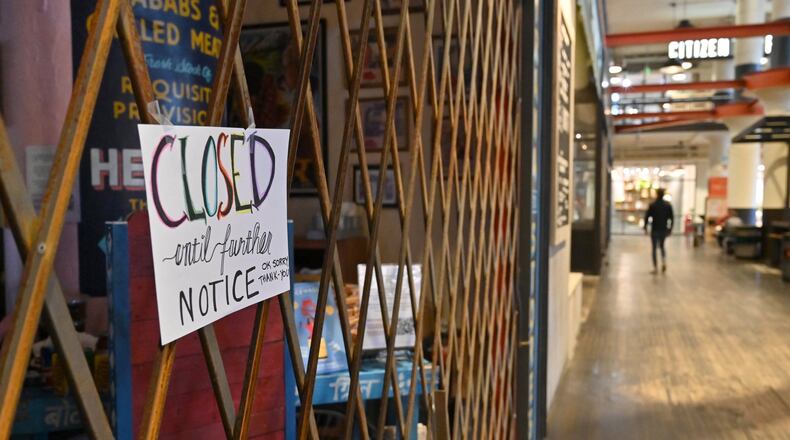A growing number of metro Atlanta cities have imposed restrictions on restaurants and other gathering places in recent days, efforts aimed at limiting crowds and slowing the spread of coronavirus.
The piecemeal approach has left residents and businesses to navigate slightly — or very — different sets of rules depending on where they’re located. And it has several local officials hankering for more uniform guidance from the state.
“A group of us have asked the governor to please take action,” Dunwoody Mayor Lynn Deutsch said during a recent City Council meeting. “Though he wants people to stay home and get take-out, he has yet to take a stand.”
Georgia Gov. Brian Kemp has repeatedly urged residents stay at home as much as possible and avoid large gatherings, echoing guidelines from the Centers for Disease Control and Prevention. He said as recently as Thursday, however, that he had no immediate plans to impose mandates on restaurants or other gathering places.
Such policies have the potential to exacerbate an already dire situation for local businesses, but several governors across the country — from California to Ohio to New York — have put statewide restrictions in place, to varying degrees. The most extreme, in California, have closed all but essential businesses and ordered residents to shelter in their homes.
Kemp said during a Thursday press conference that he’s listening to health experts who are “saying, ‘Do not do this at this time.’” Thus far, that stance has led municipalities to adopt their own policies a la carte. Many cities have put no restrictions in place yet.
“We have not received any guidance from public health agencies encouraging local governments to take action,” Alpharetta assistant city manager James Drinkard said on Friday.
Policies in cities that have taken action sometimes vary wildly.
There's a full-on curfew in the city of South Fulton. In Dunwoody, Smyrna and Suwanee, restaurants are restricted to take-out and delivery service. In Doraville, everything from spas to hair salons are temporarily closed. In Decatur, all gatherings of more than 50 people are banned — including weddings and funerals. Further east, Athens-Clarke County has enacted a "shelter in place" order while still allowing restaurants to offer take-out and delivery.
Decatur Mayor Patti Garrett said the actions, or lack thereof, from other local governments weighed heavy in her decision to sign an executive order. The city of Atlanta's decision to put similar restrictions in place helped Decatur make the leap, Garrett said during a Thursday night coronavirus discussion hosted by DeKalb County.
“If we were the only city that did make those changes, how effective was that going to be?” Garrett said.
Bill Brown, owner of There gastropub in Brookhaven, said his takeout business has been good since the city ordered restaurants to stop on-premises dining early this week. But he worries that residents who want to ignore social distancing guidelines and enjoy a sit-down dinner could now drive to a nearby area where restaurants don't face restrictions.
"If we're gonna make a real full attempt to flatten this curve, than it has to be statewide," Brown said. "We need to all get on the same page here."
In Dunwoody, the restrictions forced the Porter Brew & Que brewpub to temporarily let go of a handful of employees as it shifts to a takeout-only system. But the restaurant has added an incentive to attract residents: Anyone who places a to-go order of $50 or more can bring a 64-ounce beer growler and have it sanitized and filled up for free. Many of the cities are allowing restaurants and bars to sell alcohol to-go for the time being.
“Everybody’s feeling it. There’s no way around it; it was the right thing to do,” said Ryan Stillings, the bar manager at Porter. He knows businesses in nearby Roswell and Alpharetta may still be open for in-person dining, but “I can’t blame a restaurant for keeping their doors open and offering sit-down service.”
During a Wednesday night meeting, Doraville Councilwoman Rebekah Cohen Morris called the lack of uniformity “ridiculous.”
“I would like for our governor to provide guidance for the cities,” she said. “But in the absence of leadership giving us a strong direction, I think that it would be prudent of us to step up and make these kinds of restrictions.”
» COMPLETE COVERAGE: Coronavirus in Georgia
DeKalb County CEO Michael Thurmond appears to be mulling a countywide emergency declaration but has thus far put no restrictions on restaurants or other gathering places. During Thursday night’s town hall, he said it was probably a good thing to leave control in the hands of local officials — but it does have the potential to make things more complicated.
“That’s great, we’re closer to the problem,” Thurmond said. “The challenge is that different elected officials have different philosophies and different strategies.”
Smyrna Mayor Derek Norton, meanwhile, said he hasn’t sensed frustration among his fellow mayors. Norton signed a declaration of emergency on Friday that limits restaurants in his city to take-out service.
“There is no script for how to handle this,” he said, adding that allowing cities to address their specific issues is the best way to proceed.
“I think every community is different,” he said, “and no one has been through this before.”
—Staff writer Kristal Dixon contributed to this article.
Keep Reading
The Latest
Featured





